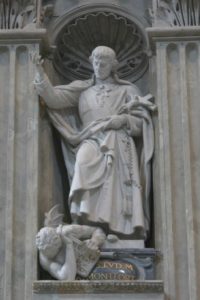Many people, including Catholics and ex-Catholics, seek “spirituality” in Buddhism, Yogic meditation, New Age Movements, the Cosmic Consciousness movement, and other such sources. For me, one of the saddest developments in spiritual “exploration” emerged in a letter from the former Jesuit Provincial of Wisconsin, a good friend for many of us at Marquette University, who became Pastor at Creighton University for fourteen years. Now an octogenarian, he wrote to fellow Jesuits and friends that he had decided to leave the Jesuit priesthood and all “hierarchies,” to attain “unity with the cosmos.” He wrote, “It is time for the Church to turn her attention from saving face to saving the earth, from saving souls to saving the planet.”
Feelings of “transcendence” have been common to human beings around the globe from time immemorial, and have given rise to whole religions. But in Catholicism the study of spirituality (ascetical theology) is far advanced beyond basic religious experiences and even the systematic Eastern meditative practices.
The traditional presentation of the spiritual stages, found in the works of John of the Cross, Bonaventure, Bernard of Clairvaux, and others, is often in terms of three stages – the “purgative, illuminative, and unitive” states – although some writers like St. Theresa, who speaks of seven “mansions,” incorporate subdivisions.
The Purgative stage is characterized by conversion, a firm resolve to avoid sin and the near occasions of sin, the practice of regular prayer, and in some cases sensory consolation or delight in spiritual things.
The Illuminative stage leads to deeper prayer, often accompanied by trials and temptations and/or occasional experiences of divine presence, and rarely some special gifts (visions, dreams, etc.). Some spiritual writers use the figure of a sculptor working on a block of wood or marble, with much exertion and little-by-little accomplishment, to create a Christ-like figure.
The Unitive stage brings about the constant, even sensible, experience of the presence of God, which God the Father describes for St. Catherine of Siena in her Dialogue: “To such of these is granted never to feel my absence. I told you how I go away from others (in feeling only, not in grace) and then return. I do not act thus with these most perfect ones who have attained great perfection and are completely dead to every selfish impulse.” Souls in this stage are impervious to attacks from the devil, and don’t fear suffering. Reading this, I think of St. Paul’s words: “And I live, now not I; but Christ lives in me” and “with Christ I am nailed to the cross.” (Gal. 2:19-20).

At a recent retreat at a Trappist monastery, I decided to refresh my memory of the three stages by reading Ralph Martin’s hefty and excellent book, The Fulfillment of All Desire, which features quotations from the saints I’ve mentioned as well as Thérèse of Lisieux and Francis de Sales.
Aside from realizing that I hadn’t got very far in my spiritual journey, my reading stimulated two main lines of thought:
1) What about Mother Teresa? No sense of the presence of God for about the last fifty years of her life? How do we explain what seems to be a tremendous exception to the “rule” of spiritual progress? Perhaps differences related to her personality, temperament, inner strength? Perhaps a reflection of the tremendous darkness of faith in the contemporary world? At least we get the impression that there is no cut-and-dried formula for attaining spiritual perfection.
2) What about lay persons? What about people like me, with bumbling attempts at prayer, work schedules, family issues, breakdowns of cars, computers, plumbing, persistent health problems, and, for the most part, a strongly secular environment? Throughout Martin’s 500-page book, all of the discussions (except those based on St. Francis de Sales) were relevant only to consecrated religious.
Are there any recent lay saints who have approximated what the doctors of ascetical theology call the “unitive” state. I can think only of a few recent women saints like Gemma Galgani (1878-1903) who probably did reach that stage, but no men. (That may be due to my lack of hagiographical knowledge.)
But not to worry. St. Louis de Montfort is on the layperson’s side.
In Friends of the Cross, Montfort addresses courageous lay Christians: “You are a group of crusaders united to fight against the world, not like those religious, men and women, who leave the world for fear of being overcome, but like brave, intrepid warriors on the battlefront, refusing to retreat or even to yield an inch.”
St. Thomas Aquinas would almost certainly disagree. He argues in the Summa that those who join religious orders to save their souls were doing the most prudent thing, fleeing the temptations and distractions of the world. Montfort’s equivalent to the “unitive stage,” in contrast, is simply the grace to keep fighting for Christian truth and goodness, and to prudently and courageously deal with the crosses that come in our life – even the ones that we have brought upon ourselves.
But Montfort’s fulsome praise of the cross is best taken in the context of his lifelong advocacy of “total consecration” to Mary, as spelled out in his book, True Devotion to Mary. Montfort criticizes spiritual writers and directors who are influenced by the traditional analogy (in the “illuminative” stage) of the sculptor painstakingly chipping off parts of a block to create a Christ-like figure. With total consecration to Mary, he asserts, the chisels and picks can be tossed away, since they are replaced with a mold that gradually and accurately re-creates the image of Mary’s divine Son.
The crosses are tailor-made, apportioned with a motherly touch to the capacities of Mary’s clients. This, claims Montfort, is the “quickest and easiest” way to attain perfection.
“Easy” and “quick” are strong inducements, if perhaps relative terms. So we shouldn’t get easily discouraged. Those who take this path to spiritual perfection won’t have knowledge of what “stage” they’re at. But they’ll know, for sure, that they’re in good hands.















